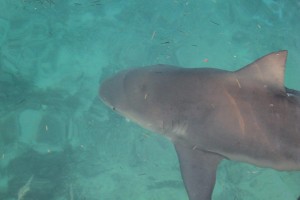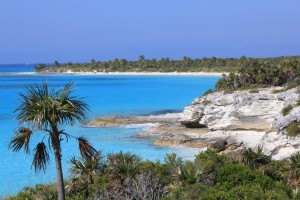Every time I travel to a tropical destination, I wrestle with the way I’m drawn to the ocean while simultaneously being wary of it. A mysterious world lies hidden below its surface. Fish, coral, invertebrates, various species that live in the warm shallows and others found only in the deepest, darkest depths. Is exploring it worth risking a menacing confrontation with a barracuda, the sting of a jellyfish, or a bite by a shark? The payoff could be stealing a glimpse of an eel as it slithers along the crevices of a reef or, even better, spotting an elusive octopus that makes a rare morning appearance before quickly disappearing.
“Will I have to worry about anything dangerous or scary?” I can’t hold back from posing this question to nearly every snorkeling guide I hire, despite my knowing the answer.
In the twenty years I’ve been fascinated with the ocean, not one guide has cautioned me against getting in the water. Instead, they tell me of all the creatures they hope we’ll see. Because they know the habits and territories of the underwater residents, the guides sometimes graciously bring food and snacks for their hungry, finned friends—and we snorkelers get to take part in a neighborly little block party while we’re in town visiting. The guides say things like, “with any luck, we’ll find the seahorse” and “sometimes we see a nurse shark.” Whoa! I heard that! My ears perk up and my heart skips a beat in trepidation.
I’ve never faced any threat greater than having to dodge sea urchins, but I still can’t subdue the prevailing thought that makes me nervous to get in the salty sea: a potential encounter with a shark. You might think that the informational Discovery Channel series, Shark Week, would undo the damage to my psyche that the movie Jaws inflicted on me. But fear came before rationale, and now it’s very hard to get rid of.
During spring break in 2002, I was swimming in the Atlantic Ocean, off the eastern coast of Florida. I was warned that a small shark had chomped on someone’s ankle a week earlier. The bite occurred in the same shallow water where my husband, Greg, and our four children bounced along breaking waves and bodysurfed. Their giggles and carefree smiles indicated that, unlike me, they were not the least bit concerned. They had no idea there was potential danger. I wasn’t about to spoil their fun, but I recall feeling extremely relieved when we left Cape Coral Beach with all body parts intact.
Nine years later, off the desolate coast of Eluthera in the Bahamas, Greg and I met two people—a doctor and his wife—on Lighthouse Beach. They looked to be serious, experienced snorkelers. Wearing full wetsuits, this couple was prepared to go into deeper, colder water than I could tolerate. Greg and I watched from the shore as they dared to go on the outer side of the reef. We relaxed on the beach for awhile and were just preparing to head into the Caribbean when the couple returned. They had been frightened by the sighting of a bull shark and decided they had had enough fun for one day. They left the beach, and Greg and I were completely alone.
At that point, I was a little intimidated to enter the sea. There was no cell phone coverage for miles; nobody to cry out to for help. The nearest paved road was a forty-five minute drive away on a rutted, dirt road squeezed down to one lane by dense brush and trees encroaching it on each side. Having a beach all to ourselves was both extraordinary and problematic.
I was apprehensive, but we had planned to snorkel, so that’s what we did. We stayed on the inside of the reef to avoid the deeper, colder, and predator-infested sea. And I prayed that God would keep the bull shark away from us.
While Greg never tired of the underwater wonders, my body’s defense mechanism eventually kicked in. I started shivering from being in the cold sea too long and had to return to the warmth and safety of the shore. Unscathed, I compared fish stories with Greg. Thankfully, neither of us came nose-to-nose with the ten-foot long behemoth.
By far, the most frightening moment of my life occurred a year earlier, off Siesta Key Beach, in the Gulf of Mexico. Once again, my children were happily playing in the ocean. They were standing in waist-high water, a couple hundred feet from shore and far beyond my protection as I entered the gulf. I froze in place when I witnessed a sinister dorsal fin rise above the smooth blue surface and travel directly toward them.

A bull shark anticipates an easy dinner as it waits for chum at the Cape Eleuthera Marina (formerly Powell Pointe Marina). Photo: Kelly Bixby
I was immediately terrified and panicked. My voice was the only weapon I had in the battle to save my children. There was no other way for me to intervene. Behaving like a lunatic, I frantically waved my arms and screamed, “Get out of the water!”
Part of me realized I could be making a deadly demand of them. Better advice would have been to have them stand as still as possible. No splashing. No fleeing. Be courageous and don’t become its prey. If all that fails, fight. Punch it in the nose or poke it in an eye. But I wasn’t thinking calmly. My children were in peril, and I was out of my mind with worry. Seconds seemed eternally long before the wind carried hope my way. From behind me on shore, a man spoke words, full of knowledge and reason, to inform me that the imposing creature was only a dolphin.
What faith I put in his observation. I wanted to believe him. I needed to believe him. Surely he was better than me at recognizing the difference between the gentle, arching movement as a dolphin rolls through water and the more rigid, racing, cutting precision a shark displays when it’s locked on a target. I could be wrong, but he must not be.
I saw my children vying to get to shore and meekly waved them off. I relayed the good news, “It’s only a dolphin!” but they continued on their way. Dread developed into laughter by the time they reached me. We caught our breath and watched other children who jumped into a kayak and quickly paddled towards the dolphin in order to get a closer look. They might have missed it, had I not made a spectacle of myself.
Shark tales like these are why I find comfort in hiring snorkeling guides when I’m exploring new places. Guides know how best to navigate narrow openings like those in between fire coral formations. They know the lay of the land. They’ve repeated the same route hundreds of times. I expect them to keep me safe, yet I also know my confidence in them is overrated. They’re not captains who will go down with their ships. They’re not mother bears ferociously protecting their precious cubs. They’re not any more prepared than a crazy mama like me in being able to fend off Megalodon.


You do a good job of painting the image of you going into protective mama bear mode. How priceless!
Thanks, Sue. Shark attacks, like the ones recently off the coast of North Carolina, add to my worries. I’m very grateful that all I’ve ever really had to endure was anxiety and embarrassment.
Good story, Kelly. I enjoyed it.
Thanks, Claire.
That was a fun read, Kelly. Enjoyed it.
Thank you, Karen.